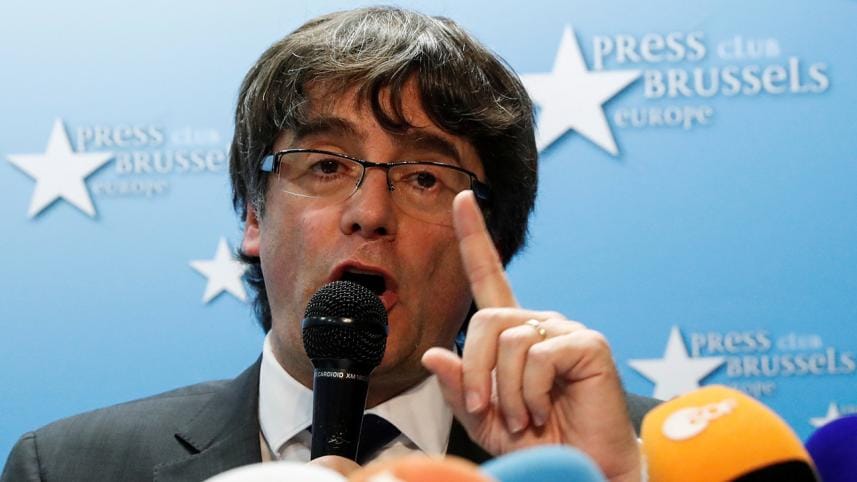Sacked Catalan leader seeks legal advice in Belgium

Catalonia's deposed separatist leader Carles Puigdemont sought legal advice in Belgium on Monday where he spoke to a lawyer who has worked on asylum cases, as prosecutors in Spain demanded he be charged with rebellion.
The fresh twist in the secessionist crisis came as Catalans went to work for the first time since the central government imposed direct rule on the region after its parliament declared independence on Friday, with no major disruptions reported.
But as workers went about their daily business despite uncertainty generated by the declaration, a big question mark remained over Puigdemont's whereabouts.
He appeared on television on Saturday urging "democratic opposition" to Madrid's move to take power in the semi-autonomous northeastern region, but has not been heard of since.
It eventually emerged he had travelled to Belgium, where he contacted Paul Bekaert, a lawyer who has in the past worked on asylum cases involving Spaniards in the Basque Country, once hit by decades of violence waged by armed separatist group ETA.
Speaking to Flemish television VRT on Monday, Bekaert said "Mr. Puigdemont is not in Belgium to request asylum."
"On this matter, nothing has yet been decided," he said, adding however that Puigdemont had appointed him as his lawyer.
Belgium's immigration minister, a member of the Flemish separatist N-VA party, suggested on Saturday that Puigdemont could receive asylum but Prime Minister Charles Michel later poured cold water on the idea.
In an interview with Catalonia's TV3 television, the region's axed vice president Oriol Junqueras said Puigdemont would explain Tuesday what he was doing in Belgium.
Rebellion, sedition accusations
Upping the ante in the standoff, Spain's chief prosecutor said he was seeking charges including rebellion -- punishable by up to 30 years in prison -- and sedition against the Catalan leaders who were sacked by the central government.
Jose Manuel Maza said they had "caused an institutional crisis that led to the unilateral declaration of independence carried out on October 27 with total contempt for our constitution". A court now has to decide whether to bring charges.
Puigdemont maintains that the result of an independence referendum that took place on October 1 despite a court ban gave the region's parliament a mandate to declare it was breaking away from Spain.
Following this declaration, Madrid took control of the region under a previously unused "nuclear option" in the constitution.
Spanish Prime Minister Mariano Rajoy called snap elections for December 21 to replace the Catalan parliament in a drastic bid to stop the secessionist drive.
Clear your desks
With its own language and distinct culture, Catalonia accounts for a fifth of the eurozone country's economy and had a high degree of autonomy over key sectors such as education, healthcare and the police.
On Sunday there was speculation that Catalan leaders and civil servants might seek to disrupt Madrid's move to impose direct rule once people returned to work on Monday.
Catalan police, now under orders from Madrid, were told they could allow the dismissed leaders to enter the government headquarters in Barcelona, but only to clear their desks.
But in the end, apart from one regional minister who tweeted a photo of himself at his desk, there was no major resistance.
"For now everything is very quiet. People have returned to work as normal," said Joan Escanilla from the CSIF civil servants union.
Separatist parties to stand
Analyst Sandra Leon from York University in England told AFP that Rajoy's move to call snap elections appeared to have wrong-footed the separatist camp.
"This isn't the framework they (the independence camp) had imagined of passive resistance, of mobilisation, that's changed completely," she said.
A member of Puigdemont's PDeCAT, which together with other separatist parties has a narrow majority in the Catalan parliament, said Monday that it would stand in the December election, against expectations of a possible boycott.
Junqueras said that his ERC party would also take part in the vote, which would be "one more opportunity to make ourselves heard."
Whether the small far-left CUP party, an ally of Puigdemont, will also stand remains to be seen.



 For all latest news, follow The Daily Star's Google News channel.
For all latest news, follow The Daily Star's Google News channel.
Comments